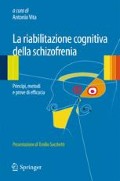Riassunto
Il Cogpack® è uno dei software maggiormente utilizzati sia in ambito clinico che di ricerca nella riabilitazione cognitiva della schizofrenia. Da un’analisi della letteratura (Pubmed, Google Scholar, con i seguenti termini di ricerca: Cogpack®Marker, Cog-Pack Marker, Schizophrenia) risultano oltre cento pubblicazioni che utilizzano questo software. Dato che il programma è stato sviluppato in Germania, il maggior numero di studi è stato pubblicato sulle principali riviste tedesche a diffusione nazionale e internazionale, ma attualmente il suo impiego è diffuso a livello internazionale. La sua efficacia viene indagata sia come potenziante i domini cognitivi notoriamente deficitari nella schizofrenia sia in associazione ad altri tipi di riabilitazione psichiatrica al fine di verificare il miglioramento del funzionamento quotidiano dei pazienti.
Access this chapter
Tax calculation will be finalised at checkout
Purchases are for personal use only
Preview
Unable to display preview. Download preview PDF.
Bibliografia
Aghotor J, Pfueller U, Moritz S et al (2010). Metacognitive training for patients with schizophrenia (MCT): feasibility and preliminary evidence for its efficacy. J Behav Ther Exp Psychiatry 41:207–211
Bechdolf A, Wagner M, Ruhrmann S et al (2012). Preventing progression to first-episode psychosis in early initial prodromal states. Br J Psychiatry Jan 200:22–29
Bechi M, Riccaboni R, Ali S, Fresi et al (2012). Theory of mind and emotion processing training for patients with schizophrenia: Preliminary findings. Psychiatry Res 198:371–377
Bowie CR, McGurk SR, Mausbach B et al (2012). Combined cognitive remediation and functional skills training for schizophrenia: effects on cognition, functional competence, and real-world behavior. Am J Psychiatry 169:710–718
Brenner HD, Roder V, Hodel B et al (1994). Integrated psychological therapy for schizophrenic patients. Hogrefe & Huber, Seattle
Cavallaro R, Anselmetti S, Poletti S et al (2009). Computer-aided neurocognitive remediation as an enhancing strategy for schizophrenia rehabilitation. Psychiatry Res 169:191–196
Cornblatt BA, Malhotra AK (2001). Impaired attention as an endophenotype for molecular genetic studies of schizophrenia. Am J Med Genet 105:11–15
Heinrichs DW, Hanlon TE, Carpenter WT (1984). The Quality of Life Scale: an instrument for rating the schizophrenic deficit syndrome. Schizophr Bull 10:388–398
Kay SR, Opler LA, Fiszbein A (1987). The Positive and Negative Syndrome Scale (PANSS) for schizophrenia. Schizophrenia Bull 13:261–276
Lindenmayer J-P, McGurk SR, Khan A et al (2012). Improving social cognition in schizophrenia: a pilot intervention combining computerized social cognition training with cognitive remediation. Schizophr Bull. doi: 1093/schbul/sbs120
Lindenmayer J-P, McGurk SR, Mueser KT et al (2008). A randomized controlled trial of cognitive remediation among inpatients with persistent mental illness. Psychiatr Serv 59:241–247
McGurk SR, Mueser KT, Pascaris A (2005). Cognitive training and supported employment for persons with severe mental illness: one year results from a randomized controlled trial. Schizophr Bull 31:898–909
McGurk SR, Twamley EW, Sitzer DI et al (2007). A meta-analysis of cognitive remediation in schizophrenia. Am J Psychiatry 164:1791–802
Moritz S, Woodward TS (2007). Metacognitive training for schizophrenia patients (MCT): a pilot study on feasibility, treatment adherence, and subjective efficacy. Ger J Psychiatry 10:69–78
Niendam TA, Bearden CE, Johnson JK et al (2006). Neurocognitive performance and functional disability in the psychosis prodrome. Schizophr Res 84:100–111
Nuechterlein KH, Barch DM, Gold JM et al (2004). Identification of separable cognitive factors in schizophrenia. Schizophr Res 72:29–39
Poletti S, Anselmetti S, Bechi M et al (2010). Computer-aided neurocognitive remediation in schizophrenia: durability of rehabilitation outcomes in a follow-up study. Neuropsychol Rehabil 20:659–674
Pukrop R, Schultze-Lutter F, Ruhrmann S et al (2006). Neurocognitive functioning in subjects at risk for a first episode of psychosis compared with first-and multiple episode schizophrenia. J Clin Exp Neuropsychol 28:1388–1407
Rauchensteiner S, Kawohl W, Ozgurdal S et al (2011). Test-performance after cognitive training in persons at risk mental state of schizophrenia andpatients with schizophrenia. Psychiatry Res 185:334–339
Roder V, Brenner HD, Müller D et al (2002). Development of specific social skills training programmes for schizophrenia patients: results of a multicentre study. Acta Psychiatr Scand 105:363–371
Vita A, De Peri L, Barlati S et al (2011). Effectiveness of different modalities of cognitive remediation on symptomatological, neuropsychological, and functional outcome domains in schizophrenia: A prospective study in a real-world setting. Schizophr Res 133:223–231
Wölwer W, Frommann N (2011). Social-cognitive remediation in schizophrenia: generalization of effects of the Training of Affect Recognition (TAR). Schizophr Bull 37:S63–S70
Wölwer W, Frommann N, Halfmann S et al (2005). Remediation of impairments in facial affect recognition in schizophrenia. Efficacy and specificity of a new training program. Schizophr Res 80:295–303
Author information
Authors and Affiliations
Corresponding author
Editor information
Editors and Affiliations
Rights and permissions
Copyright information
© 2013 Springer-Verlag Italia
About this chapter
Cite this chapter
Bechi, M., Zanoletti, A., Cavallaro, R. (2013). Cogpack®: prove di efficacia. In: Vita, A. (eds) La riabilitazione cognitiva della schizofrenia. Springer, Milano. https://doi.org/10.1007/978-88-470-2802-9_13
Download citation
DOI: https://doi.org/10.1007/978-88-470-2802-9_13
Publisher Name: Springer, Milano
Print ISBN: 978-88-470-2801-2
Online ISBN: 978-88-470-2802-9
eBook Packages: MedicineMedicine (R0)

